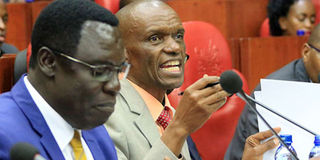Seized sugar unfit for human consumption, says PS

Health PS Peter Tum (left) with Director of Public Health Kepha Ombacho before the House Committee on sugar on July 3, 2018. PHOTO | JEFF ANGOTE | NATION MEDIA GROUP
What you need to know:
- According to the ministry, about 174 samples were collected across the country for testing.
- Nairobi, Nakuru and Kiambu counties are listed to have recorded the highest batches of contaminated sugar.
- Dr Ombacho told the committee that not even animals can be allowed to use the contaminated sugar.
Health Principal Secretary Peter Tum says that 60 per cent of the sugar seized in various parts of the country is unfit for human consumption following a series of tests conducted by the ministry, which showed presence of high moisture content.
Mr Tum, who was accompanied by Director of Public Health Dr Kepher Ombacho, said that the ministry undertook a series of analyses involving chemical issues and moisture content.
“We have written to the counties and the national government agencies to ensure that the contaminated sugar that is under seizure is maintained pending destruction,” Mr Tum told a joint sitting of Agriculture and Trade committees of the National Assembly.
The two committees are investigating the presence into the market of contraband sugar that is feared to be laced with heavy metals like copper, mercury and lead following the alarm about four weeks ago by Interior Cabinet Secretary Fred Matiang’i.
HEAVY METALS
On Tuesday, the PS, however, said that chemical analyses in terms of presence of the heavy metals is ongoing but noted that even if the presence of the metals is negligible, it will still be destroyed.
According to the ministry, about 174 samples were collected across the country for testing. He did not divulge the individuals behind the seized sugar.
But according to the PS, Nairobi, Nakuru and Kiambu counties are listed to have recorded the highest batches of contaminated sugar.
Dr Ombacho told the committee that not even animals can be allowed to use the contaminated sugar.
“If we pick one parameter (chemical issues or moisture level component) and we conclude that it is contaminated we don’t test the others as it is already unfit for human consumption,” Dr Ombacho said.
This comes as Kenya Bureau of Standards (Kebs) gave contradicting information over the type and quality of duty free sugar that was imported into the country last year.
RAW SUGAR
Whereas Kebs acting managing director, Dr Moses Ikiara, told the MPs that only four companies were permitted to import bulk raw sugar for further processing, Kebs’ own report before Parliament says that all the 370 companies imported bulk brown sugar and were issued with certificates of conformity.
According to Dr Ikiara, West Kenya Sugar Company Limited, Sukari Limited, Amnav Limited and Menengai Oil Refineries Limited brought in raw sugar that was supposed to have been processed before being sold but this was not the case.
“If sugar documentation is not presented to Kebs, then it is not known to us. The Kenya Ports Authority public health is supposed to deal with that,” Dr Ikiara, who was only appointed last year, said.
SELL SUGAR
A letter dated July 23, 2017 from Kenya Ports Authority (KPA) to various government agencies, among them Kebs, indicated that some consignment of raw sugar left the port without processing as required.
It also emerged that some companies, among them Hydrey (P) and Sony Sugar, were allowed to sell sugar directly to Kenyans at the point of entry without re-bagging and further processing. The Kebs boss, nevertheless, sought more time to provide the required information as MPs wanted clarity on the conflicting information.
On May 12, 2017, National Treasury Cabinet Secretary Henry Rotich issued a Gazette notice for the importation of duty free sugar following a prolonged drought in the sugar belt areas.
HUMAN CONSUMPTION
The problem with the notice 4536 is that it did not specify the quality and quantity of the sugar, thereby allowing all manner of sugar imports.
Dr Ikiara also told the committee that tests carried out on the sugar in the market showed that it is good for human consumption.
This came even as he told MPs that Kebs has been collecting and testing samples of sugar and that results will be out in the next five days, prompting MPs to ask how he had ascertained the suitability of the commodity given that they are still undertaking tests.
According to Kebs Act, any type of sugar imported into the country must be processed first before it is consumed because it may be laced with impurities during shipping.





